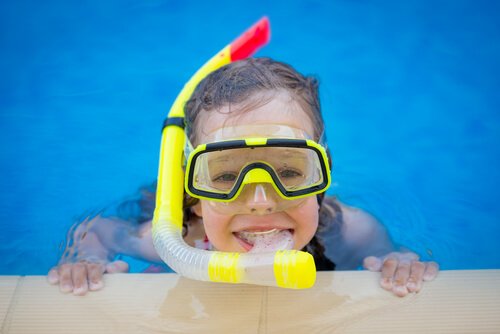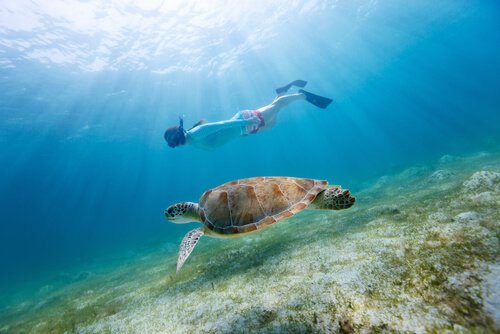All The Benefits of Scuba Diving for Children

Scuba diving for children is becoming more and more popular. It’s not surprising, because it’s an activity that can develop so many personal skills and abilities. It’s also one that kids absolutely adore.
The underwater world is very attractive for any child. For starters, there can’t be many children who don’t like the beach and the sea. And so, to be able to discover what lies beneath the sea’s surface is a real adventure for them.
Another advantage of scuba diving is that it increases a child’s general knowledge, and sparks their interest. Children learn to recognize and value the riches of the sea. This, in turn, increases their sense of responsibility towards the environment.
The best age to start
This question brings a variety of opinions and some disagreement among experts. While scuba diving for children is a safe activity, certain risks cannot be overlooked either.
Not only children, but also adults, should take precautions. Because of this, it isn’t an activity that really small children should take part in.

The child must be able to analyze the risks, and this requires a certain level of awareness and maturity. It’s also important for them to have developed some margin of self-control.
Some situations can occur underwater which could cause children to panic. This could lead to errors that may put them at risk.
The best age to start scuba diving for children is between 8 and 12 years old. This, however, isn’t a general rule.
It also depends on the child’s temperament. Some mature early on, while others take a little longer.
Around the world, scuba diving is usually permitted for children from 10 years of age. There are some countries, like Spain for example, that have more restrictions.
In Spain they regulate the dives according to age, and each province is different. This is something to bear in mind if you plan to go to Spain for your holidays and plan to do scuba diving there.
Benefits of scuba diving for children
There are many benefits of scuba diving for children. It can have a very positive impact on their physical, mental, intellectual and social development. Some of the main benefits are as follows:
- Scuba diving tones muscles and allows children to develop their psychomotor skills.
- Improves lung capacity and cardiac and circulatory functions.
- Promotes maturity in children.
- Increases self-esteem and a sense of achievement.
- Encourages responsibility.
- Stimulates imagination and creativity.
- Reinforces values associated with teamwork, solidarity and camaraderie.
One of the most important benefits is that scuba diving is an excellent way for children to manage stress.
Although children don’t have the same burdens as adults, they can also get stressed too. An activity like this helps them to channel that anxiety positively.
Aspects to consider
Diving involves some risks, all of which are manageable; we shouldn’t underestimate them however. It’s important to know some of the guidelines and dangers, such as:
- Diving instructors must be qualified professionals – not only in the activity itself, but also in working with children.
- Children under 8 years of age don’t have sufficiently developed lungs. For that reason, experts recommend that they don’t carry out this activity.
- Children under 12 are more likely to get earaches. Instructor should be able to teach them the techniques involved in the decompression of ears.
- The smaller the child, the greater the risk of hypothermia.
- The child must have a minimum height of 1.50 cm (5 feet) and a weight of 45 kg (100 pounds) to begin diving.

- Before starting scuba diving, children must already be good swimmers. It’s also important for them to master the techniques associated with the tubes.
- The first part of the instruction is carried out in a pool. After that they’ll go to open water.
- It isn’t advisable for a dive to last more than 25 minutes.
- Children cannot be diving partners with each other. Each child must dive with an experienced adult.
- Children must learn not to ascend faster than their air bubbles.
- After a dive, it’s medically forbidden to make an ascent to an altitude of more than 500 meters (1,640 feet). This applies for the 12 hours following the dive.
Children must also have sufficient autonomy. They must be able to climb into the boat by themselves and also be able to carry their own equipment and look after it.
Scuba diving for children is becoming more and more popular. It’s not surprising, because it’s an activity that can develop so many personal skills and abilities. It’s also one that kids absolutely adore.
The underwater world is very attractive for any child. For starters, there can’t be many children who don’t like the beach and the sea. And so, to be able to discover what lies beneath the sea’s surface is a real adventure for them.
Another advantage of scuba diving is that it increases a child’s general knowledge, and sparks their interest. Children learn to recognize and value the riches of the sea. This, in turn, increases their sense of responsibility towards the environment.
The best age to start
This question brings a variety of opinions and some disagreement among experts. While scuba diving for children is a safe activity, certain risks cannot be overlooked either.
Not only children, but also adults, should take precautions. Because of this, it isn’t an activity that really small children should take part in.

The child must be able to analyze the risks, and this requires a certain level of awareness and maturity. It’s also important for them to have developed some margin of self-control.
Some situations can occur underwater which could cause children to panic. This could lead to errors that may put them at risk.
The best age to start scuba diving for children is between 8 and 12 years old. This, however, isn’t a general rule.
It also depends on the child’s temperament. Some mature early on, while others take a little longer.
Around the world, scuba diving is usually permitted for children from 10 years of age. There are some countries, like Spain for example, that have more restrictions.
In Spain they regulate the dives according to age, and each province is different. This is something to bear in mind if you plan to go to Spain for your holidays and plan to do scuba diving there.
Benefits of scuba diving for children
There are many benefits of scuba diving for children. It can have a very positive impact on their physical, mental, intellectual and social development. Some of the main benefits are as follows:
- Scuba diving tones muscles and allows children to develop their psychomotor skills.
- Improves lung capacity and cardiac and circulatory functions.
- Promotes maturity in children.
- Increases self-esteem and a sense of achievement.
- Encourages responsibility.
- Stimulates imagination and creativity.
- Reinforces values associated with teamwork, solidarity and camaraderie.
One of the most important benefits is that scuba diving is an excellent way for children to manage stress.
Although children don’t have the same burdens as adults, they can also get stressed too. An activity like this helps them to channel that anxiety positively.
Aspects to consider
Diving involves some risks, all of which are manageable; we shouldn’t underestimate them however. It’s important to know some of the guidelines and dangers, such as:
- Diving instructors must be qualified professionals – not only in the activity itself, but also in working with children.
- Children under 8 years of age don’t have sufficiently developed lungs. For that reason, experts recommend that they don’t carry out this activity.
- Children under 12 are more likely to get earaches. Instructor should be able to teach them the techniques involved in the decompression of ears.
- The smaller the child, the greater the risk of hypothermia.
- The child must have a minimum height of 1.50 cm (5 feet) and a weight of 45 kg (100 pounds) to begin diving.

- Before starting scuba diving, children must already be good swimmers. It’s also important for them to master the techniques associated with the tubes.
- The first part of the instruction is carried out in a pool. After that they’ll go to open water.
- It isn’t advisable for a dive to last more than 25 minutes.
- Children cannot be diving partners with each other. Each child must dive with an experienced adult.
- Children must learn not to ascend faster than their air bubbles.
- After a dive, it’s medically forbidden to make an ascent to an altitude of more than 500 meters (1,640 feet). This applies for the 12 hours following the dive.
Children must also have sufficient autonomy. They must be able to climb into the boat by themselves and also be able to carry their own equipment and look after it.
This text is provided for informational purposes only and does not replace consultation with a professional. If in doubt, consult your specialist.








